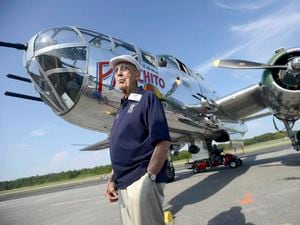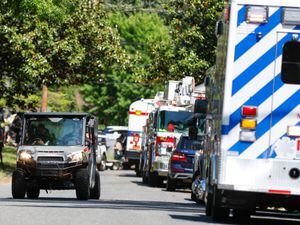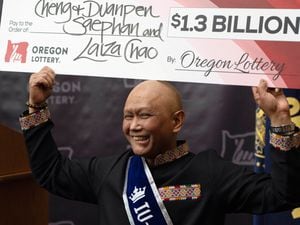Last survivor of US Doolittle Raid on Tokyo dies aged 103
The raid saw US planes hit the Japanese capital less than five months after the Empire’s attack on Pearl Harbour triggered the US entry into the war.

Retired Lieutenant Colonel Richard “Dick” Cole, the last of the 80 Doolittle Tokyo Raiders who carried out the daring US attack on Japan during the Second World War, has died at a military hospital in Texas aged 103.
A spokesman said Mr Cole died at Brooke Army Medical Centre in San Antonio.
Mr Cole’s daughter, Cindy Chal, said he was having some heart issues but had walked into the emergency room.

Mr Cole, who lived in Comfort, Texas, had stayed active even in recent years, attending air shows and participating in commemorative events including April 18 2017, ceremonies for the raid’s 75th anniversary at the National Museum of the US Air Force near Dayton, Ohio.
Ms Chal said her father “enjoyed every minute” of his long, distinguished life.
Mr Cole was mission commander Jimmy Doolittle’s co-pilot in the attack less than five months after the December 1941 Japanese bombing of Pearl Harbour.
The Raiders launched their assault on April 18, 1942, in B-25 bombers from the USS Hornet.
Suspecting they had been detected by Japanese patrols, they left farther away from Japan than planned.
The crews of the 16 planes were “very quiet” as they neared Japan, Mr Cole recalled, saying his role next to Mr Doolittle was to “be seen, not heard. … You didn’t speak until spoken to.”
But the country song Wabash Cannonball started running through his head and he unconsciously began tapping his toe, which caught Mr Doolittle’s attention. He shot Mr Cole a look, he recalled with a laugh.

Mr Doolittle soon ordered bomb bay doors opened, and the attack was on against what turned out to be limited anti-aircraft fire in the surprise attack.
They then headed to China, running out of fuel.
Mr Cole said Mr Doolittle gave the command to prepare to bail out as they neared the coast, adding: “I wish you all good luck.”
Mr Cole said it was scary to parachute into a dark “unknown” in rough weather. His parachute caught in a tree, leaving him dangling but safe. Chinese partisans helped lead him and other Raiders to safety.
Three Raiders died trying to reach China, and eight were captured by Japanese soldiers. Three were executed, and a fourth died in captivity.
Mr Cole recalled that Mr Doolittle was distraught at first, upset that he had lost all of his planes and some of his men. Mr Doolittle would later receive the Medal of Honor.
The raid inflicted scattered damage while providing a psychological lift back home. The stunned Japanese military diverted resources after a string of Pacific successes.
“Seven decades later, we are still awed by the sheer audacity of the Doolittle raid and the incredible men whose grit and bravery made it possible,” Democratic House leader Nancy Pelosi of California said when the Congressional Gold Medal was awarded to the Raiders in a 2015 ceremony.
“Though time has thinned their ranks, it will never dim the daring of their deeds.”
Mr Cole continued to fly missions in the China-Burma-India theatre until 1944, and had peacetime service assignments in several states.
Mr Cole attributed his longevity to being an optimist and living a life of “moderation”.
He said he believed he spoke for all Raiders when he said they did not want any more recognition than all the others who put their lives on the line in the war effort.
“We don’t want to be remembered any more than the rest of the people who took part in beating the Japanese,” Mr Cole said. “They started it, and we finished it.”
Ms Chal said a memorial service is planned for April 18 at Randolph Air Force Base in San Antonio. She said her father will be buried later at Arlington National Cemetery.





